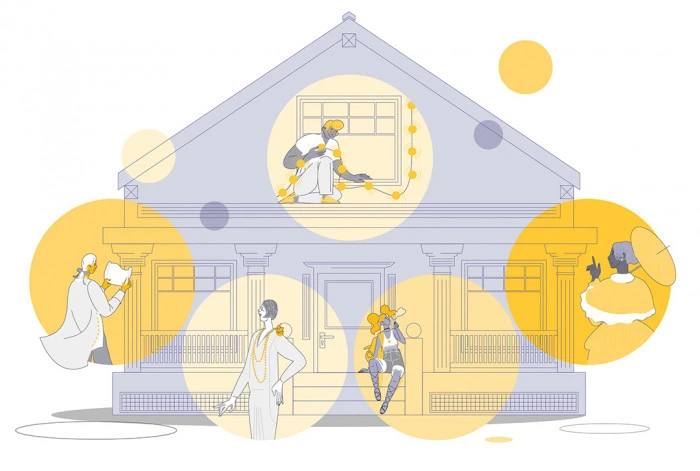Share what you know,
and discover more.
Share what you know,
and discover more.
Mar 08, 2022

-

- Charmaine Bantugan
Perkins House
Constance Perkins, a professor of art history at Occidental College, was a single, professional woman who wanted a house that would reflect her personal living style: art-loving, landscape-focused, creative, and independent. Luckily, she hired architect Richard Neutra to bring her vision to life, seeing its completion in 1955. Stepping up a steep hillside in Pasadena in what is now the Poppy Peak National Register Historic District, the diminutive house was tied to a modest budget and required innovation in design. Neutra tailored it to fit its owner in every way, literally bringing the outside inside by creating a curving pool that winds indoors under a glass wall, and scaling all the interior cabinets and fixtures specifically to Perkins' small stature. He deconstructed the form of the standard single family home by turning the usual "box" into a series of prominent horizontal planes floating lightly above each other. He also deconstructed the function of the typical house, placing an emphasis on work and creativity, rather than domesticity and family, as its central function. Perkins considered her studio the true heart of her home, spending most of her time there and even sleeping there; the bedroom was reserved for guests. The fruitful collaboration between owner and architect led not only to a strong lifelong friendship, but to a highly influential Modern design that left its mark on the movement as a whole. Photo courtesy Architectural Resources Group
Perkins House
Constance Perkins, a professor of art history at Occidental College, was a single, professional woman who wanted a house that would reflect her personal living style: art-loving, landscape-focused, creative, and independent. Luckily, she hired architect Richard Neutra to bring her vision to life, seeing its completion in 1955. Stepping up a steep hillside in Pasadena in what is now the Poppy Peak National Register Historic District, the diminutive house was tied to a modest budget and required innovation in design. Neutra tailored it to fit its owner in every way, literally bringing the outside inside by creating a curving pool that winds indoors under a glass wall, and scaling all the interior cabinets and fixtures specifically to Perkins' small stature. He deconstructed the form of the standard single family home by turning the usual "box" into a series of prominent horizontal planes floating lightly above each other. He also deconstructed the function of the typical house, placing an emphasis on work and creativity, rather than domesticity and family, as its central function. Perkins considered her studio the true heart of her home, spending most of her time there and even sleeping there; the bedroom was reserved for guests. The fruitful collaboration between owner and architect led not only to a strong lifelong friendship, but to a highly influential Modern design that left its mark on the movement as a whole. Photo courtesy Architectural Resources Group
Mar 08, 2022
Perkins House
Constance Perkins, a professor of art history at Occidental College, was a single, professional woman who wanted a house that would reflect her personal living style: art-loving, landscape-focused, creative, and independent. Luckily, she hired architect Richard Neutra to bring her vision to life, seeing its completion in 1955. Stepping up a steep hillside in Pasadena in what is now the Poppy Peak National Register Historic District, the diminutive house was tied to a modest budget and required innovation in design.Neutra tailored it to fit its owner in every way, literally bringing the outside inside by creating a curving pool that winds indoors under a glass wall, and scaling all the interior cabinets and fixtures specifically to Perkins' small stature. He deconstructed the form of the standard single family home by turning the usual "box" into a series of prominent horizontal planes floating lightly above each other. He also deconstructed the function of the typical house, placing an emphasis on work and creativity, rather than domesticity and family, as its central function. Perkins considered her studio the true heart of her home, spending most of her time there and even sleeping there; the bedroom was reserved for guests. The fruitful collaboration between owner and architect led not only to a strong lifelong friendship, but to a highly influential Modern design that left its mark on the movement as a whole.
Photo courtesy Architectural Resources Group
Posted Date
Mar 07, 2022
Historical Record Date
Mar 08, 2022
Source Name
Los Angeles Conservancy
Source Website
Delete Story
Are you sure you want to delete this story?










